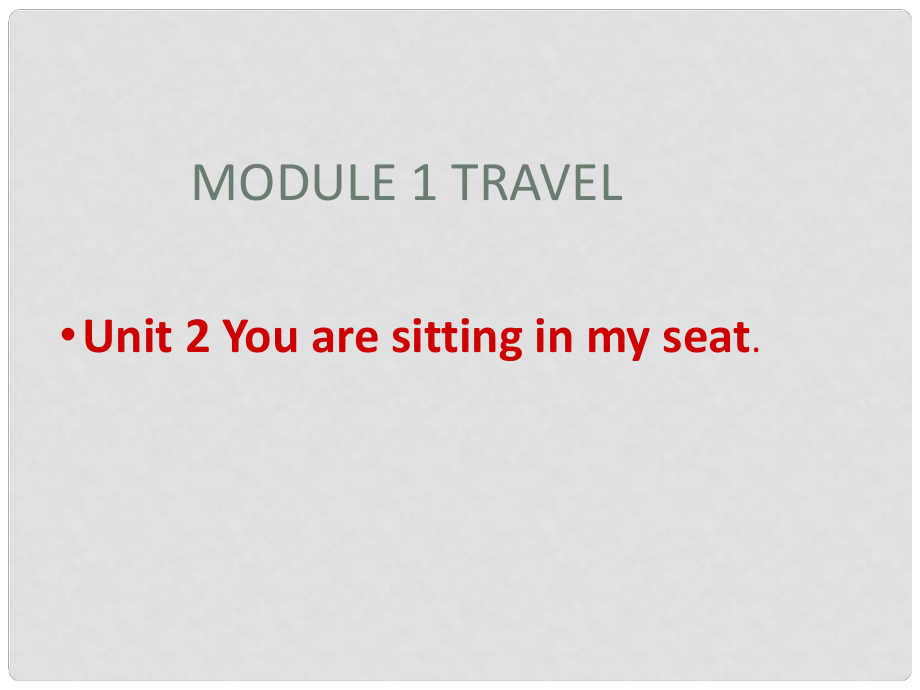《廣東省佛山市中大附中三水實(shí)驗(yàn)中學(xué)九年級(jí)英語(yǔ)下冊(cè) Module 1 Travel Unit 2 You are sitting in my seat課件 外研版》由會(huì)員分享���,可在線閱讀��,更多相關(guān)《廣東省佛山市中大附中三水實(shí)驗(yàn)中學(xué)九年級(jí)英語(yǔ)下冊(cè) Module 1 Travel Unit 2 You are sitting in my seat課件 外研版(18頁(yè)珍藏版)》請(qǐng)?jiān)谘b配圖網(wǎng)上搜索�。
1���、MODULE 1 TRAVELUnit 2 You are sitting in my seat. 學(xué)習(xí)目標(biāo): 1. 閱讀課文并完成閱讀任務(wù)�����,培養(yǎng)skimming和scanning的能力 2. 掌握U2 的詞組 四會(huì)單詞 set off 動(dòng)身 �����;出發(fā) nod 點(diǎn)(頭) tear 眼淚 towards 往��;朝方向 cigarette 香煙 though 雖然���;盡管 get off 下(火車(chē)�����、公共汽車(chē)等) Reading skill:We often have fun when we go for a trip, but sometimes something unhappy happens. T
2��、oday we are going to learn a new lesson. Part 1: Predict (預(yù)測(cè))(預(yù)測(cè)) “ Excuse me. You are sitting in my seat” From the title(標(biāo)題)標(biāo)題), can you guess what it is about? 你坐在我的位子上�����,故事是關(guān)于座位的�����。你坐在我的位子上�����,故事是關(guān)于座位的��。LISTEN AND NUMBER THE PHRASES. his first long trip by train leaving his village and his home sitting i
3�����、n Lins seat . Slowly the young man stood up This young man has the right ticket With tears in his eyes124653 Step 2: reading task 1: Skimming:(略讀):(略讀)3 minutes This is a story. When we read a story, first we should pay attention to When: Where: Who: Why did Lin feel nervous? What happened? “5 W 1 H
4���、” On the trip to Beijing.On the train.Lin , a young man and some passengers A young man took Lins seatOther passengers asked the young man to move. Task 2: Scanning:(細(xì)讀)(細(xì)讀)5 minutes Read the passage again carefully and choose the best answers for the questions: 1. What was it like on the train? (細(xì)節(jié)
5、題)細(xì)節(jié)題) A. It was full of people and bags. B.There were few people. C. There were a number of empty seats. D. The train was dirty. 細(xì)節(jié)題:細(xì)節(jié)題: 一般是用特殊疑問(wèn)句一般是用特殊疑問(wèn)句what, when, who, where等開(kāi)始的���,只要通讀全文��,了解文中所敘述的等開(kāi)始的�����,只要通讀全文�����,了解文中所敘述的重要事實(shí)或細(xì)節(jié)����,就可以解答出來(lái),有的甚至可以從重要事實(shí)或細(xì)節(jié)���,就可以解答出來(lái)�����,有的甚至可以從文章的原句中直接找到答案�����;可以閱讀時(shí)候找準(zhǔn)關(guān)鍵文章的原句中直接找到答案
6����、�;可以閱讀時(shí)候找準(zhǔn)關(guān)鍵詞、詞組或句子��。詞�、詞組或句子。 2. The man sitting in Lins seat _.(細(xì)節(jié)題)(細(xì)節(jié)題) A. was very brave B. was unhealthy C. likes to look out of the window. D. was unfriendly. 3. Which of the following is not true? (細(xì)節(jié)題)(細(xì)節(jié)題) A. The young man shouted at Lin. B. Other passengers told the young man to move. C. The
7�、 young man disappeared down the train at last. D. The young man beat with Lin. 遇到要求判斷遇到要求判斷true 或者或者not true時(shí)候,可以使用排除時(shí)候����,可以使用排除法���。法。 4. From the last paragraph, we can infer that the man felt _. (推測(cè)題)推測(cè)題) A. nervous B. excited C. sad C. angry 推斷題:在提問(wèn)中常用的詞有推斷題:在提問(wèn)中常用的詞有suggest, mean, infer(推斷推斷),from t
8�����、he fact, indicate(暗示暗示) , probably�����,likely�,reason�,because,according to等���。等�����。 吃透文章或者關(guān)鍵段落�����,句子的表層意思���,只推吃透文章或者關(guān)鍵段落���,句子的表層意思,只推一步���。一步�����。 5. The passage is mainly about _. (主旨題)(主旨題) A. A trip to Beijing B. How Lin got back his seat. C. Passengers told the young man to move. D. Lin said no to the bad behavior. 主旨題
9��、:主旨題: 1. 概括全段思想���。概括全段思想。 2. 中心句一般位于段首���、段尾或位于段中���,它通常是中心句一般位于段首、段尾或位于段中���,它通常是用單詞��、短語(yǔ)表達(dá)的����。但有些文章沒(méi)有完整的主題句,用單詞��、短語(yǔ)表達(dá)的��。但有些文章沒(méi)有完整的主題句���,其主題只好依據(jù)整篇文章及上下文的語(yǔ)境。其主題只好依據(jù)整篇文章及上下文的語(yǔ)境�����。 主旨題常見(jiàn)的命題形式:主旨題常見(jiàn)的命題形式: (1) The main idea of this text may be. (2) This passage is mainly about (3) Which is the best title for the passage? Im
10���、portant phrases: 1. 即使即使 even though/if 2. 抽煙抽煙 smoke a cigarette 3. 朝朝.外看外看 look out of 4. 饒有興趣的饒有興趣的 with interest 5. 推開(kāi)推開(kāi) push away 6. 在在.開(kāi)始開(kāi)始 at the start/beginning of 7. 眼里含著淚水眼里含著淚水 with tears in ones eyes8. 夢(mèng)想著夢(mèng)想著dream about9. 給給.寫(xiě)信寫(xiě)信write to sb.10. 一一.就就.as soon as11. 跳上跳上jump onto12. 轉(zhuǎn)過(guò)來(lái)轉(zhuǎn)過(guò)來(lái)
11����、turn back13.堅(jiān)定的語(yǔ)氣堅(jiān)定的語(yǔ)氣in a strong voice14. 大聲地大聲地in a loud voiceIMPORTANT SENTENCES 1.Now it was in front of him, to set off soon. 火車(chē)現(xiàn)在就在面前��,馬上要開(kāi)車(chē)了���。 2.Lin nodded, unable to speak. 林點(diǎn)點(diǎn)頭��,說(shuō)不出話來(lái)����。 3.Ive got a long way to go. 我要坐很長(zhǎng)時(shí)間的火車(chē)。 4.Even if its only 10 minutes, you should move. 即使有十分鐘��,你也應(yīng)該起來(lái)��。 1. He
12�、is able to finish the work. He is unable to finish the work. 知識(shí)歸納:知識(shí)歸納: 能夠做某事能夠做某事 be able to do sth. 能夠做某事能夠做某事 = can do sth. be unable to do sth. 不能夠做某事不能夠做某事 = cant do sth. 例題:例題: 1. 你能夠唱首歌嗎?你能夠唱首歌嗎����? _ you _ a song? _ you _ a song? 2. 他現(xiàn)在不能打電腦游戲。他現(xiàn)在不能打電腦游戲��。 He _ computer games at the moment.Are a
13��、ble to sing Can singis unable to play 2. He said in a loud voice. With tears in his eyes, Jin pushed Lin away. He looked at me with interest. 知識(shí)歸納:介詞用法知識(shí)歸納:介詞用法 例題:例題: 1. He came in_ a book. A. in B. with C. use 2. He speaks _ a low voice. A. in B. with C. use 3. He watched TV _ a laugh. A. in B. of
14����、 C. with 4. You cant leave _ an umbrella. It is raining. A. with B. without C. have Exercise 1: Important phrases: 1. 即使即使 even though/if 2. 抽煙抽煙 smoke a cigarette 3. 朝朝.外看外看 look out of 4. 饒有興趣的饒有興趣的 with interest 5. 推開(kāi)推開(kāi) push away 6. 在在.開(kāi)始開(kāi)始 at the start/beginning of 7. 眼里含著淚水眼里含著淚水 with tears in
15、ones eyes8. 夢(mèng)想著夢(mèng)想著dream about9. 給給.寫(xiě)信寫(xiě)信write to sb.10. 一一.就就.as soon as11. 跳上跳上jump onto12. 轉(zhuǎn)過(guò)來(lái)轉(zhuǎn)過(guò)來(lái)turn back13.堅(jiān)定的語(yǔ)氣堅(jiān)定的語(yǔ)氣in a strong voice14. 大聲地大聲地in a loud voice Exercise 2: 完成句子完成句子 1. 我哥哥常夢(mèng)想著成為一個(gè)明星�。我哥哥常夢(mèng)想著成為一個(gè)明星����。 My brother often _ being a star. 2. 他一放學(xué)就跑出了教室�����。他一放學(xué)就跑出了教室�。 He ran out of the classro
16、om _ the school finished. 3. 當(dāng)你下車(chē)的時(shí)候��,別忘了你的行李�����。當(dāng)你下車(chē)的時(shí)候�����,別忘了你的行李���。 When you _ the train, dont forget your package. 4. 他們昨天動(dòng)身去廣州了。他們昨天動(dòng)身去廣州了�。 They _ for Guangzhou yesterday. 5. 他不能按時(shí)完成作業(yè)。他不能按時(shí)完成作業(yè)����。 He _ finish homework on time.dreams about as soon as get off set off cant/ is unable to Homework: Exercise 4 Write about something that happened during a trip you have made.
 廣東省佛山市中大附中三水實(shí)驗(yàn)中學(xué)九年級(jí)英語(yǔ)下冊(cè) Module 1 Travel Unit 2 You are sitting in my seat課件 外研版
廣東省佛山市中大附中三水實(shí)驗(yàn)中學(xué)九年級(jí)英語(yǔ)下冊(cè) Module 1 Travel Unit 2 You are sitting in my seat課件 外研版

